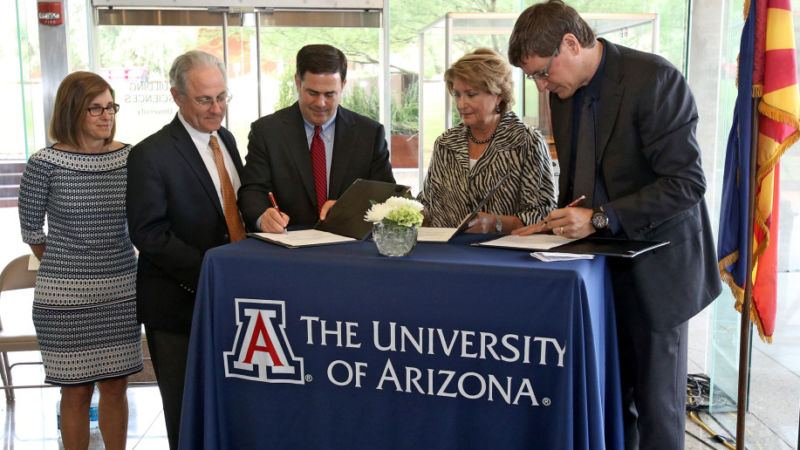
Exactly what does the word “secret” mean?
Arizona Governor Doug Ducey and local business supporters are not happy with The Guardian newspaper, which reported on Wednesday that he and Uber “kept [Uber’s] self-driving program secret, emails reveal.”
As Matthew Benson, an Arizona lobbyist and Ducey ally, wrote:
Easily the silliest and most self-debunking story of 2018 (so far) comes courtesy of The Guardian. Far from secret, @dougducey ‘s support of ridesharing and autonomous technology has been open & enthusiastic
— Matthew Benson (@MatthewWBenson) March 28, 2018
The British newspaper based its reporting on a large cache of newly released emails between Uber and Ducey’s office that goes back years. (Ars received a large portion of those emails from the governor’s office on Wednesday, and we have published them.)
The Guardian’s revelations come less than two weeks after a woman in Tempe died after being struck by a self-driving Uber. As a result, Gov. Ducey ordered the company to stop such testing in Arizona—Uber ended up pulling all of its autonomous vehicles off the streets in California, Pennsylvania, Arizona, and Toronto.
It is true that since at least 2015, Ducey has offered prominent support for autonomous vehicles in general. On August 25, 2015, Gov. Ducey famously signed a two-page executive order mandating that the state’s Department of Transportation, among other state agencies, “shall undertake any necessary steps to support the testing and operation of self-driving vehicles on public roads within Arizona.”
That order opened the doors to Uber, Waymo, Cruise, and a slew of rivals who happily raced to the Arizona desert. It’s why Waymo chose Chandler, Arizona, as the location for the testing of its real-world driverless taxi service last year. Waymo also plans to launch a related commercial service later this year.
But, it was not previously known that Uber had specifically told Ducey’s office in August 2016 that the company would be road-testing autonomous vehicles imminently. That fact was kept quiet for months, until Uber announced it planned to begin driverless road tests in Arizona.
As a result of the Tempe incident, there are three investigations (two federal, one local) now underway, as is Uber’s own inquiry. When they will be completed remains anyone’s guess.
Gov. Ducey—who once wrote in a December 2016 statement that “Arizona welcomes Uber self-driving cars with open arms and wide open roads”—now faces scrutiny about exactly how close he was to Uber.
Keep it on the DL
In one email, dated August 19, 2016, Uber official Ashwini Chhabra emailed Ducey’s deputy chief of staff, Danny Seiden. Chhabra wrote that the company would be “testing some self-driving functionality” and asked for an introduction to “someone discreet in Phoenix PD” to let them know as well. However, Uber’s AV tests quietly continued for four months before they were publicly announced.
Uber declined to respond to Ars’ questions on the record.
In essence, Ducey and his supporters now seem to suggest that because it was known back in 2015 that he supported self-driving cars, neither he nor Uber were under any obligation to disclose to the public precisely when Uber’s AVs hit the road in August 2016.
On Wednesday, the governor’s office did not substantively answer Ars’ questions about the nature of its relationship with Uber, referring us instead to a two-page “point-by-point” rebuttal of The Guardian’s story.
“From the beginning, Arizona has been very public about the testing and operation of self-driving cars—it has been anything but a secret,” Patrick Ptak, a Ducey spokesman, emailed Ars. “The Governor’s Executive Order allowing for the operation and testing of driverless cars was signed a year prior to this email being sent. In addition, the Governor has also demonstrated he will hold companies accountable when necessary, as his letter to Uber this week indicates.”
In that same 2015 executive order, Gov. Ducey also mandated the creation of the “Self-Driving Vehicle Oversight Committee,” whose goal was to “advise… pertinent agencies how best to advance the testing and operation of self-driving vehicles on public roads.”
The email cache also shows that Chhabra suggested that he himself sit on the committee, representing Uber—a move that does not appear to have taken place. That committee held its first and possibly only meeting on August 15, 2016, just days before Uber informed Ducey’s office that its AVs would be launched.
The meeting, which lasted just 42 minutes, made no mention of Uber.
In Wednesday’s two-page rebuttal, Ducey’s staff wrote that the committee’s purpose had been “fulfilled,” suggesting that it will have no role in oversight of the inquiry into the recent Tempe accident.
https://arstechnica.com/?p=1285071

